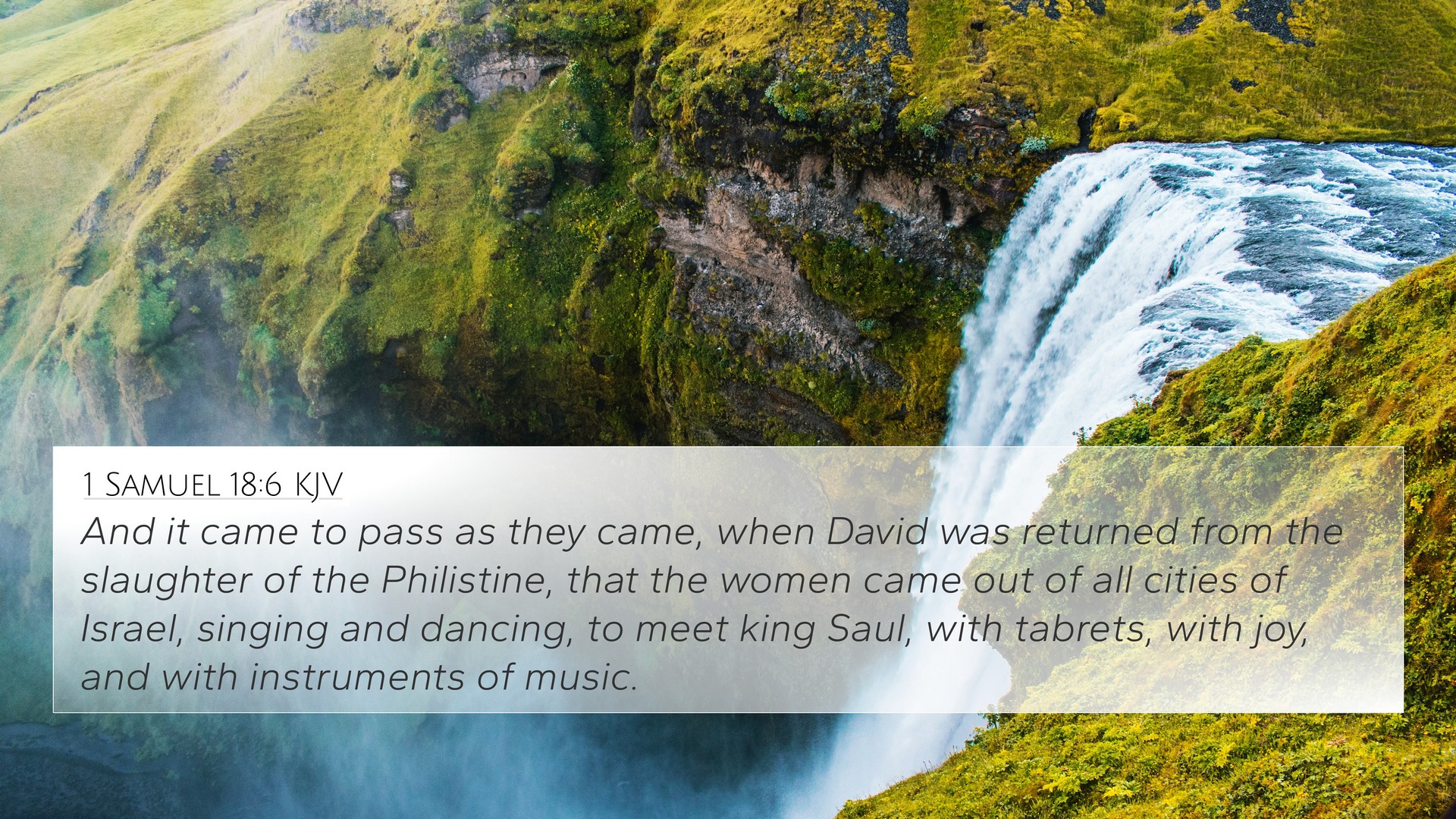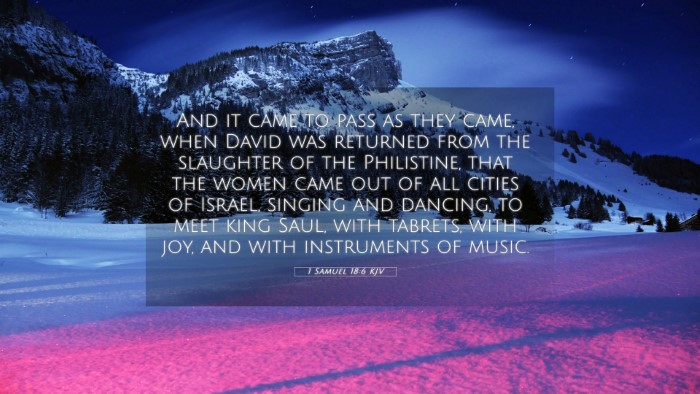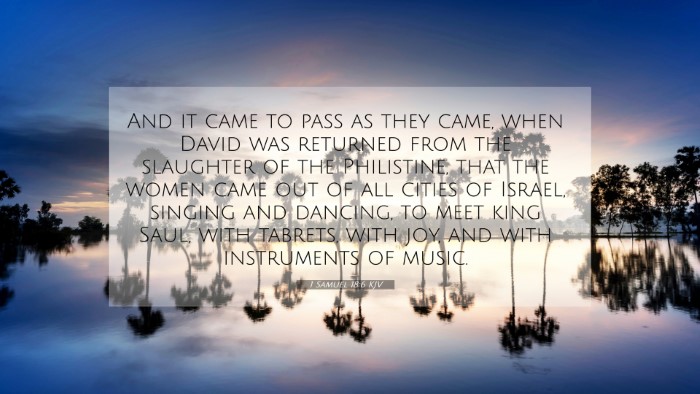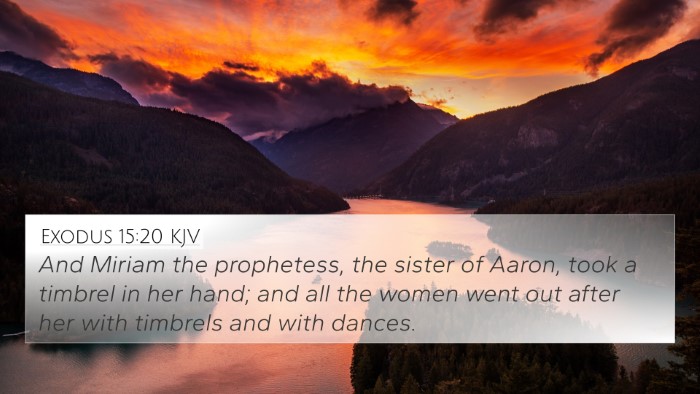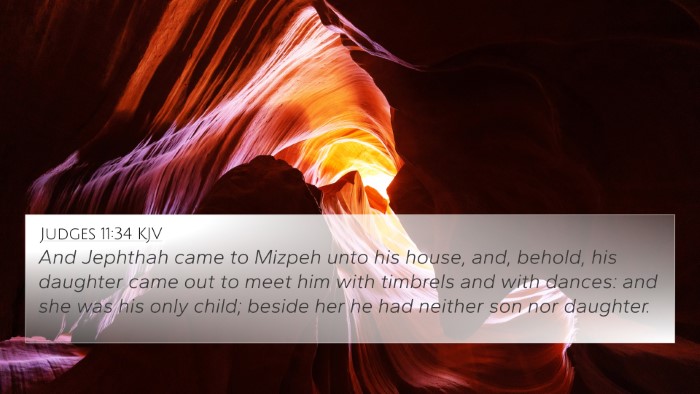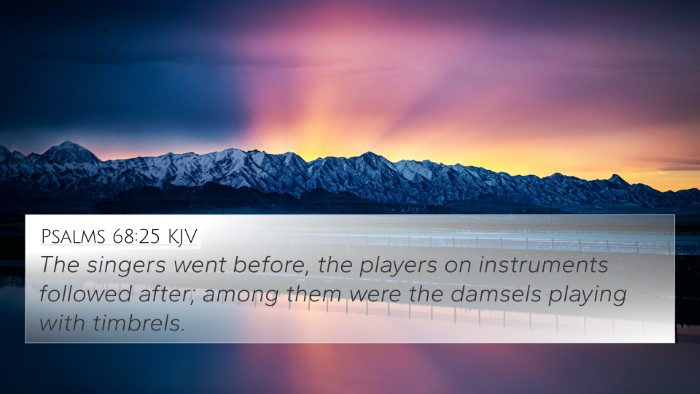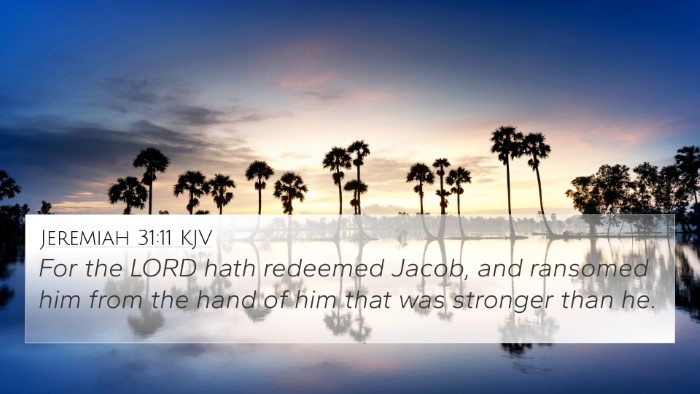Meaning and Interpretation of 1 Samuel 18:6
Verse: 1 Samuel 18:6 - "And it came to pass, as they came, when David was returned from the slaughter of the Philistine, that the women came out of all cities of Israel, singing and dancing, to meet King Saul, with tabrets, with joy, and with instruments of music."
This powerful verse captures a moment of celebration and recognition as David returns victorious from his battle against Goliath. This not only highlights his valor but also foreshadows the complexities of his relationship with Saul and the eventual shift in power dynamics within Israel.
Commentary Insights
Matthew Henry's Commentary
Matthew Henry emphasizes the joy of the people when David returns from battle. The women sing songs of praise, showcasing the public admiration for David. Henry suggests that this celebration implies the respect David received as a leader, which was in stark contrast to Saul’s troubled spirit as he began to feel threatened by David’s rising popularity.
Albert Barnes' Notes
Albert Barnes notes that music in this verse symbolizes joy and unity among the Israelites. The act of singing and dancing is a cultural expression of victory and gratitude towards God for their deliverance. He also points out that this marks the beginning of rivalries and tensions that will unfold in the narrative, especially in the dynamic between Saul and David.
Adam Clarke's Commentary
Adam Clarke highlights the significance of women leading the celebration, which reflects their crucial role in the community. He suggests that the intensity of this celebration may have contributed to Saul’s growing jealousy and paranoia. Clarke draws attention to the instruments used, underscoring a complete cultural expression of victory and the inclination toward worship.
Cross-References
1 Samuel 18:6 is connected to several other Bible verses that echo themes of recognition, leadership, and tension. Below are notable cross-references:
- 1 Samuel 16:13: David's anointing as king.
- 1 Samuel 17:50-51: David’s victory over Goliath.
- 1 Samuel 18:7: The women’s song that praises David over Saul.
- 1 Samuel 19:1: Saul’s plot against David.
- 2 Samuel 1:20: David’s lament for Saul and Jonathan.
- 2 Samuel 6:14: David dancing before the Lord.
- Psalms 20:7: Trust in the name of the Lord.
- Psalms 144:1: A psalm of David that speaks of victory.
- Philippians 2:3-4: Paul’s call for unity and humility.
- James 4:6: God resists the proud but gives grace to the humble.
Understanding the Celebration
Through the lens of cross-referencing Biblical texts, we can see how 1 Samuel 18:6 fits into a broader narrative of Hebrew Scriptures that emphasizes the importance of community, leadership, and divine intervention in times of strife.
- Celebration of victory aligns with other examples where God's deliverance is praised (like Exodus 15:1-21).
- The theme of rising leaders is echoed in the struggles of many characters, for instance, Joseph's rise in Egypt (Genesis 41:46).
Thematic Connections
This verse also illustrates the inter-Biblical dialogue regarding pride and humility. Saul’s envy of David can serve as a cautionary tale regarding the effects of jealousy and the importance of acknowledging God’s hand in one’s victories.
Applying the Insights
- Tools for Bible cross-referencing: Utilize Bible concordances to explore thematic verses connected to David and Saul.
- Cross-reference Bible study: Encourage study groups to analyze the dynamics of leadership as demonstrated in these narratives.
- Comprehensive Bible cross-reference materials: Consult resources that elaborate on the significance of celebrations in the Old Testament.
Conclusions
1 Samuel 18:6 serves not only as a historical account but also as a rich source for spiritual reflection and understanding about human emotions in leadership. We learn about the effects of celebration, public perception, and the underlying tensions that can arise even in times of joy.
By diligently linking Bible scriptures and exploring these connections, one can gain profound insights into how biblical themes of victory, jealousy, and divine sovereignty thread throughout the narrative, enriching one's personal study and understanding of scripture.
